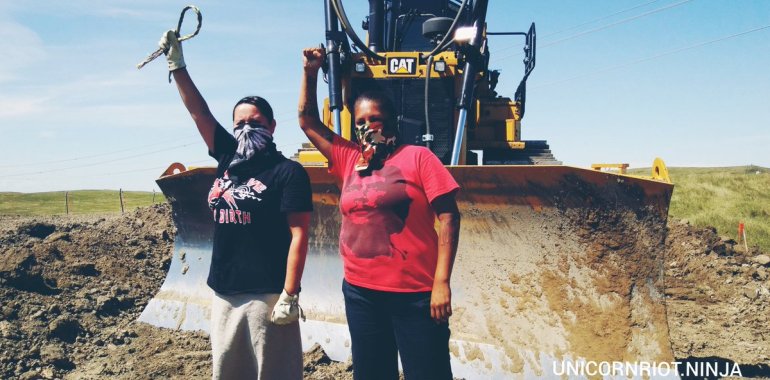Filed under: Central, Development, Environment, Indigenous, Interviews, Video

From Unicorn Riot
Upon his return to Denver from the construction site of the Dakota Access Pipeline (DAPL) in early September, we sat down with Uŋpa Nuŋpa of the Zintkala Luzahan Camp to hear his story.
Uŋpa first shared his eyewitness account of the women-led direct action that took place on August 15thwhich resulted in work stoppage. He said he thinks of the Oceti Sakowin camp, gathered in response to the pipeline issue, as an opportunity for all indigenous peoples in this hemisphere to begin addressing historical injustices and broader issues.
There’s nothing to negotiate. Either they build the pipeline or they don’t. You don’t negotiate half a pipeline. And either we stop this pipeline, or it gets built. – Uŋpa Nuŋpa
He also talked about the attack that occurred on September 3rd, when the private security company for the pipeline unleashed dogs on the protesters. Six individuals were injured by the dogs, including Uŋpa’s daughter.
In response to rumors and speculation regarding the events of September 3, Uŋpa said “I think all one has to do is look at the video footage and listen to the eyewitness accounts of our people to know what really happened.”
Uŋpa described the especially mystical and peaceful aspects of being in the camp, with everyone coming together as a community without the need for police, banks or jails. He stated he feels like a “true self-sovereign” there, and referenced the encampment as an opportunity for expression.
Living under a system like we do, like I’ve known my whole life, this is an opportunity for us to express our feelings about having to live under that system, this system, where everything is wrong, and everybody knows what’s wrong … and the earth, the environment being destroyed in the name of profit. – Uŋpa Nuŋpa





